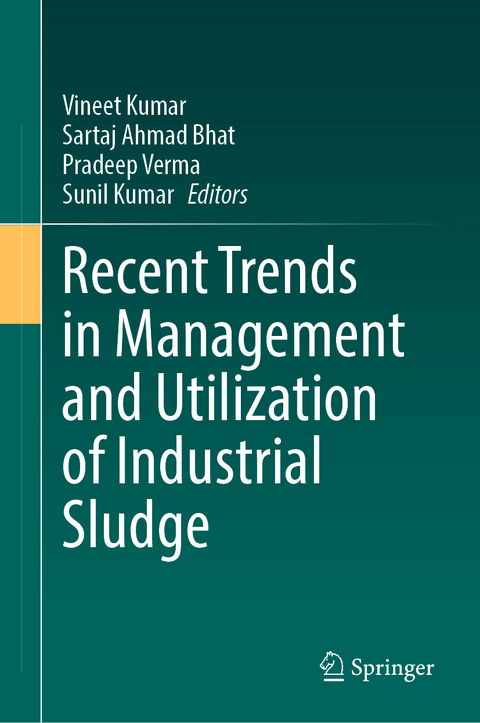
Recent Trends in Management and Utilization of Industrial Sludge
Springer International Publishing (Verlag)
978-3-031-58455-8 (ISBN)
This book discusses the latest information and advancements on all aspects of sustainable sludge management including treatment, characterization, stabilization, digestion, thickening, dewatering, thermal processing, utilization, valorization production of usable materials, and disposal, with associated pros and cons addressed. It provides an up-to-date resource on industrial sludge generation in various industries, its disposal and treatment by various modern treatment approaches, its physico-chemical and microbiological characterization, as well as legislation, risk assessment, and methodological aspects related to its characterization. Past and recent trends in industrial sludge handling are covered to understand and overcome the environmental risks posed by industrial sludge, with a focus on the brick and agrochemical industries and how to implement sustainable sludge managements practices in these industries. The book is intended for environmental engineers, chemical engineers,soil scientists, and policymakers, and will be of interest to students and researchers of environmental biotechnology, environmental engineering, and chemical engineering.
Vineet Kumar is working as a National Postdoctoral Fellow (N-PDF) in the Department of Microbiology at Central University of Rajasthan, India. He received his M.Sc. and M.Phil. in Microbiology from the Department of Microbiology at Ch. Charan Singh University, Meerut, India. Subsequently, he earned his Ph.D. in Environmental Microbiology from Babasaheb Bhimrao Ambedkar (A Central) University, Lucknow, India in 2018. His research interests include waste management, bioremediation, phytoremediation, metagenomics, wastewater treatment, environmental monitoring, bioplastic, and biofuel production. He has published more than 50 articles in peer-reviewed international journals of repute, 55 book chapters, 1 technical report, and 4 scientific magazine articles, with more than citations 2500, and h-index 31. In addition, he has published 2 authored and 22 edited books on various aspects of science and engineering by renowned international publishers. He has been serving as a guest editor and reviewer in more than 65 International Journals for his research area. He is an active member of numerous scientific societies including the Microbiology Society (UK), the Indian Science Congress Association (India), the Association of Microbiologists of India (India), the Biotech Research Society (India). He is founder of the Society for Green Environment, India (website: www.sgeindia.org).
Sartaj Ahmad Bhat is working as a JSPS Postdoctoral Researcher at the River Basin Research Center, Gifu University, Japan. He received his Ph.D. in Environmental Sciences from Guru Nanak Dev University, Amritsar, India in 2017. His research interests focus on vermicomposting treatment of various solid wastes, especially for investigations on fate and behavior of emerging pollutants during biological treatment of organic wastes. He has published more than 65 papers in peer-reviewed journals and edited over 15 books published by Elsevier Science, CRC Press, Royal Society of Chemistry, International Water Association and Springer Nature. Dr. Bhat is serving as an Associate/Academic Editor and Editorial Board Member/ Advisory Board Member of more than 20 journals published by Frontiers, Springer, Elsevier, PLOS, Hindawi, and De Gruyter. Dr. Bhat is a recipient of several prestigious awards such as the JSPS Postdoctoral Fellowship to pursue research at River Basin Research Center, Gifu University, Japan, the Basic Scientific Research Fellowship (BSR JRF, SRF) by the University Grants Commission (UGC) India, the DST-SERB National Postdoctoral Fellowship at CSIR-NEERI, Nagpur, India and Swachhta Saarthi Fellowship by the Govt. of India. Dr. Bhat has also received the 2020 Outstanding Reviewer Award by the International Journal of Environmental Research and Public Health, MDPI, and the Top Peer Reviewer 2019 Award in Environment and Ecology by Web of Science and has more than 800 Verified Reviews and 75 Editor Records to his credit.
Pradeep Verma is working as aProfessor in the Department of Microbiology, School of Life Sciences at Central University of Rajasthan, Rajasthan, India. He is a well-rounded researcher with more than 21 years of experience in leading, supervising, and undertaking research in the broader field of bioprocess and bioenergy production from lignocellulosic waste with a focus on waste management. He earned his Ph.D. in Microbiology from Sardar Patel University in Gujarat, India in 2002. His research area of expertise involves microbial diversity, bioremediation, bioprocess development, lignocellulosic and algal biomass-based biorefinery. He has more than 92 research articles in peer-reviewed international journals and contributed to 52 book chapters in different edited books with citations of more than 6336, and h-index of 41. He has also edited 12 books by international publishers such as Springer, Taylor and Francis CRC Press and Elsevier. He also holds several International patents in the field of microwave assisted biomass
Chapter 1 Fundamentals of industrial sludge.- Chapter 2 Management of textile industry sludge for environmental sustainability.- Chapter 3 Sustainable management of oily petroleum refinery sludge through anaerobic digestion with bioenergy production.- Chapter 4 Hydrothermal carbonization of industrial sludge.- Chapter 5 Sustainable management of industrial sludge through vermistabilization utilizing pollutants loaded spent biochar produced from wastewater treatment process.- Chapter 6 Production of microbial fuel cell material from industrial wastewater sludge.- Chapter 7 Industrial sludge as adsorbent for wastewater treatment and reclamation.- Chapter 8 Sustainable utilization of industrial sludge in the construction industry.- Chapter 9 Utilization of waste sludge and poplar trees for remediation.- Chapter 10 Sustainable production of enzymes using industrial sludge.- Chapter 11 Sustainable application of industrial sludge in agriculture land.- Chapter 12 Production of biodiesel from industrial sludge.- Chapter 13 Advancement in sustainable management and valorization of solid waste through composting and vermitechnology.
| Erscheinungsdatum | 25.06.2024 |
|---|---|
| Zusatzinfo | XXII, 400 p. 52 illus., 49 illus. in color. |
| Verlagsort | Cham |
| Sprache | englisch |
| Maße | 155 x 235 mm |
| Themenwelt | Naturwissenschaften ► Biologie ► Ökologie / Naturschutz |
| Technik | |
| Schlagworte | Agrochemical industry • Environmental Engineering • Environmental sustainability • Industrial Sludge • valorization • waste management |
| ISBN-10 | 3-031-58455-4 / 3031584554 |
| ISBN-13 | 978-3-031-58455-8 / 9783031584558 |
| Zustand | Neuware |
| Haben Sie eine Frage zum Produkt? |
aus dem Bereich


